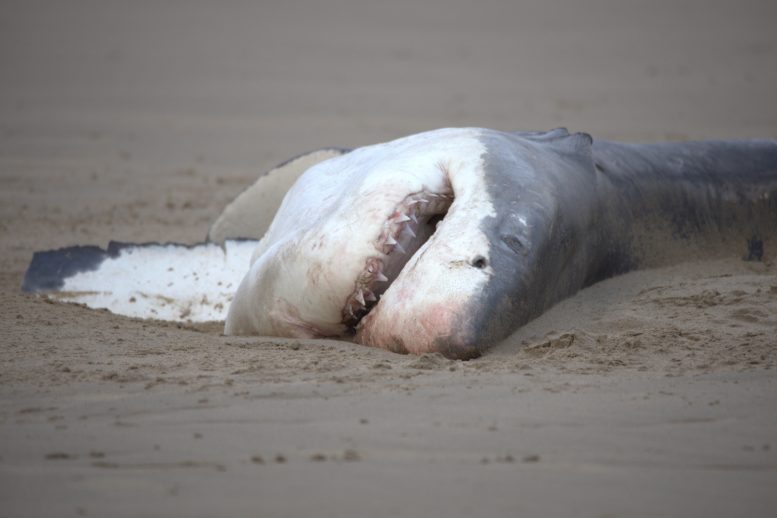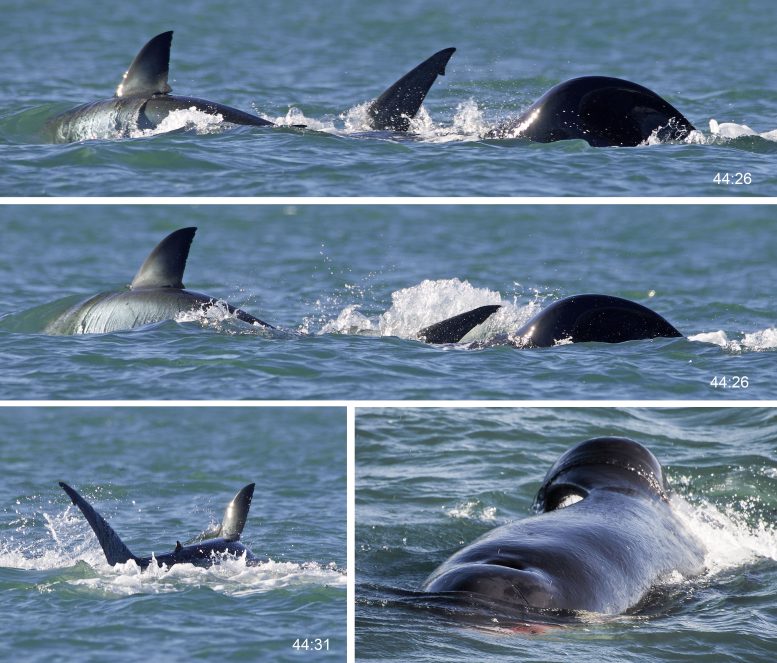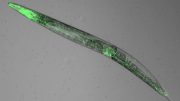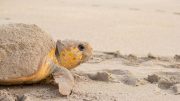
A groundbreaking study documents the first-ever observation of an orca individually consuming a great white shark in South Africa, challenging previous notions of orca hunting behavior and highlighting their adaptability. This discovery raises concerns about the ecological impact on shark populations and emphasizes the importance of collaborative science and adaptable conservation efforts in understanding and protecting marine ecosystems. Credit: Christiaan Stopforth, Drone Fanatics SA
Research reveals “astonishing” footage showcasing new hunting strategies of orcas, heightening worries about the state of the marine ecosystem.
An orca (killer whale) has been observed, for the first-ever time, individually consuming a great white shark – and within just two minutes.
“The astonishing predation, off the coast of Mossel Bay, South Africa, represents unprecedented behavior underscoring the exceptional proficiency of the killer whale,” remarks Dr. Alison Towner from Rhodes University, who led an international research team into the discovery.
Their findings were recently published in the peer-reviewed African Journal of Marine Science.
The groundbreaking insight is the latest from Dr. Towner and the team, who, in 2022 in the same journal, revealed that a pair of orcas were hunting and killing great white sharks off the coast of South Africa since 2017 – managing to drive large numbers of the sharks from their natural aggregation sites.
Orcas are generally known to work together to catch large prey like sea lions, seals, and even other whales – and of course, sharks too. By hunting together, they can surround prey and use their combined intelligence and strength to attack.
They can hunt large animals individually. However, this is the first such occurrence on what is one of the world’s largest predators – the great white.
Specialized Feeding Behavior Observed
“Again, as previously in South Africa, the orcas are exhibiting a strong preference for extracting and consuming the lipid-rich livers of white sharks – a specialized feeding behavior,” explains Dr. Towner, who has studied great white sharks for the last 17 years, learning about their movement patterns through tagging data.
“But what we witnessed was an orca, nicknamed Starboard – due to his collapsed dorsal fin – performing alone to incapacitate and consume a white shark within an astounding two-minute timeframe.
“Starboard was observed preying on a 2.5-meter (8.2 feet) juvenile white shark, later carrying the shark’s liver in its mouth past a boat.
“This sighting revealed evidence of solitary hunting by at least one killer whale, challenging conventional cooperative hunting behaviors known in the region.
“These are groundbreaking insights into the predatory behavior of this species, and our findings significantly contribute to the global understanding of Killer Whale predation dynamics, enhancing knowledge of marine ecosystems and predator-prey relationships.”
During the observed interactions of this event, at least two white sharks were killed, as evidenced by the discovery of a second carcass measuring 3.55 meters (11.6 feet) nearby.
Implications for Shark Populations and Marine Ecosystems
“The study raises critical questions about the impact of killer whale predation on shark populations in South Africa,” Dr. Towner says. “The displacement of various shark species due to killer whale presence may have implications for mesopredator release and potential trophic changes in the marine ecosystem.”
Understanding the ecological dynamics of killer whale predation is paramount for marine conservation efforts. The authors state that this event “underscores the urgent need for adaptable conservation strategies and vigilant ecological monitoring amidst changing environmental conditions.”
Founding Director and Principal Scientist at Sea Search Research & Conservation, and at the Department of BotZoo, University of Stellenbosch, Dr. Simon Elwen, is an expert in the ecology, behavior, and conservation status of whales.
Commenting on the importance of Dr. Towner’s team’s findings, he says: “The observations reported here add more layers to the fascinating story of these two killer whales and their capabilities. As smart, top predators, killer whales can rapidly learn new hunting techniques on their own or from others, so monitoring and understanding the behaviors used here and by other killer whales in South Africa is an important part of helping us understand more about these animals.”
The involvement of land-based observers, tourists on vessels, and collaborating institutions played a “pivotal role” in capturing this crucial data and footage of the predation events.
This particular event “underscores the benefits of citizen science as a collaborative effort between researchers, tourists, and organizations,” the authors state.
Esther Jacobs, from the marine conservation initiative, Keep Fin Alive, recounts her experience witnessing the predation: “Upon reaching Mossel Bay’s Seal Island, the scent of shark liver oil and a noticeable slick indicated a recent kill. Tracking Port and Starboard near the island, they remained separated.
“Witnessing a white shark’s fin break the surface initially sparked excitement, but that turned to a somber realization as Starboard swiftly approached. The moment Starboard rapidly preyed on my favorite shark species was both devastating and intensely powerful.”
Co-author Dr. Primo Micarelli, from the Shark Studies Centre and Siena University, was on board the vessel White Shark Africa and commented: “Over two decades of annual visits to South Africa, I’ve observed the profound impact these killer whales have on the local white shark population. Seeing Starboard carry a white shark’s liver past our vessel is unforgettable.
“Despite my awe for these predators, I’m increasingly concerned about the coastal marine ecology balance.”
Concluding, Dr. Towner highlights that the new findings on killer whales provide important further insights into how adaptable mammalian predators specialize and diverge ecologically.
“The presence of these shark-hunting killer whales possibly ties into broader ecosystem dynamics. Rapid developments in this phenomenon, make it challenging for science to keep pace, prompting us to publish these timely short communications.”
Reference: “Further insights into killer whales Orcinus orca preying on white sharks Carcharodon carcharias in South Africa” by A Towner, P Micarelli, D Hurwitz, MJ Smale, AJ Booth, C Stopforth, E Jacobs, FR Reinero, V Ricci, A Di Bari, S Gavazzi, G Carugno, M Mahrer and E Gennari, 1 March 2024, African Journal of Marine Science.
DOI: 10.2989/1814232X.2024.2311272










Killer whale vs the dinosaur saltwater crocodile who is king of the beast in water
Does this mean my taxes are going up, to fight Global orca feeding habit change?
I don’t know which one to root for.